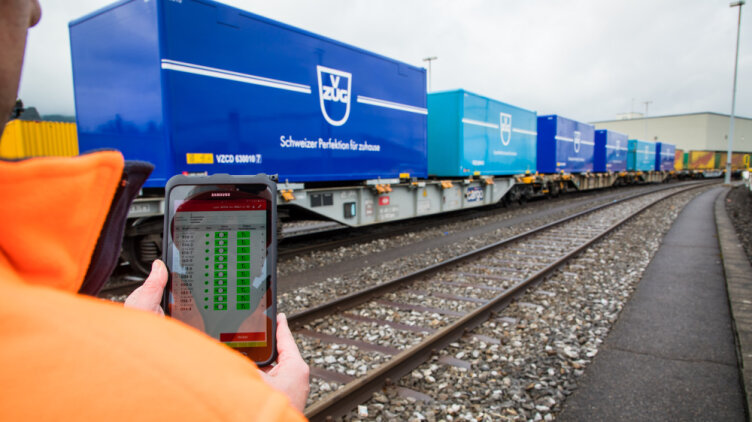Faster, safer, more economical: The Swiss Railway company SBB Cargo and PJM, the Austrian railway systems specialist, are working together on the development of an "intelligent freight train". SBB Cargo and PJM rely on the automation system PSS 4000 from Pilz for the automated brake test examined under the scope of this initiative.
Ostfildern, 14 Oct 2021
"Intelligent freight train" initiative with control technology from Pilz – Complete solution for automated brake testing
Digitalised and automated processes can increase the punctuality and reliability of rail traffic. Project partners in the "Intelligent freight train" initiative include the leading rail freight companies in Switzerland, Austria and Italy, as well as the railway specialists PJM. Their particular interest is the semi-automation of train preparation. Newly developed communication and cloud solutions, combined with suitable sensor technology, are intended to help make testing of the brakes prior to departure much simpler and at the same time safer.
Automated replaces manual
One of the first steps towards an intelligent freight carriage is automated brake testing, which to date has been time consuming: with each newly formed train, technical staff check the functionality of the brakes manually, directly on the carriage. In future this process is intended to be automated from the point of view of safety. Shunting operations and the affected track section benefit from greater safety ahead of or at the action site.
Industry-proven control technology for railways
The automation company Pilz worked with PJM to develop a complete solution consisting of hardware and approved application software for an automated brake test: The solution installed on the freight carriages includes the automation system PSS 4000-R, which was designed specifically for automation tasks in the railway industry. The control system determines the status of the brakes and forwards this status to a telematics system, which is also installed on the carriage. The control solution is connected to the train driver's tablet via the local wireless system and to the web-based back-end system via the mobile wireless standard LTE. That way the train driver is always informed about the current status and functionality of the brakes, without having to test them manually prior to each departure and for each individual carriage.
Error sources "prior to departure" can be reduced this way; the train can be prepared more quickly. On a 500 m-long freight train the automated brake test means a saving of up to 30 minutes. That increases the punctuality and reliability and therefore the efficiency of rail transport significantly.
You’ll find further information about Pilz’s automation solutions for the railway sector here

Pilz Automation Ltd
Pilz House, Little Colliers Field
Corby, Northants, NN18 8TJ
United Kingdom
Telephone: +44 1536 460766
E-Mail: sales@pilz.co.uk
Telephone: +44 1536 460766
E-Mail: marketing@pilz.co.uk
